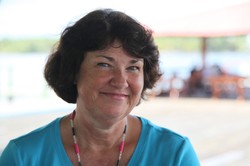Madame St. Etienne* and her family once grew sugarcane, corn, and beans and raised goats, cattle and chickens on five acres in Trou-du-Nord, Haiti.
It was not an easy life, but she, her husband and their 10 children grew enough food to meet the family’s needs and sold the extra in the marketplace.
That all changed last year when the government of Haiti signed a contract granting land to an international agribusiness company, including land farmed by people like the St. Etiennes. In many cases, property cultivated by Haitian families for generations is now part of a large banana and plantain plantation. More than 800 families suffered a plight similar to the St. Etiennes. Their land, which once yielded crops to feed Haitian families, now grows fruit exclusively for export.
The company sent armed men to claim the St. Etiennes’ property, located about 170 miles from Haiti’s capital, Port-au-Prince. “They came to break the land,” Madame says. “One day they cut all the trees in the front. The coconuts, all the fruit trees were broken. I cried. I just cried.”
The St. Etienne family was able to stay in their home because Haitian law says families that live on public land for more than 10 years can claim legal title to it. However, these families are entitled to only the property immediately surrounding their residence and not the adjacent land, even though in many situations the same family has farmed it for decades. The St. Etiennes lost their garden plot, cropland and grazing space, so the family’s ability to feed itself has been greatly diminished.
It’s legal, and common, for families to farm public land in Haiti. But once the government sells the property to private owners, the families have no recourse but to give up the land they’ve been farming.
Cindy Corell, a PC(USA) mission co-worker in Haiti, is helping Haitians seeking to reform laws related to public land ownership. Corell is companionship facilitator for the Joining Hands ministry in Haiti.
Joining Hands, an initiative of the Presbyterian Hunger Program, links networks of churches and other groups in foreign countries with congregations and presbyteries in the United States.
In Haiti, the Joining Hands network is called FONDAMA, a Creole acronym that in English means Hand in Hand Foundation. “FONDAMA is working on the issue of agricultural reform,” Corell says. “We’re making sure that farmers understand their rights, and we’re trying to strengthen agrarian laws.” The land-tenure system in Haiti is very loose, and most people owning land do not have an official deed to prove it.
One of Corell’s roles is to encourage U.S. Presbyterians to join with Haitians as they seek a more secure future. She shares stories of the Haitian people, facilitates relationships between Presbyterians and Haitian partners and invites Presbyterians to join with them in their quest for justice.
Presbyterians, she notes, can make a difference by working for U.S. policies that will help the landless and voiceless in Haiti, the most impoverished country in the Western Hemisphere. Through building relationships with Haitians, Presbyterians can grow spiritually as well as gain a better understanding of justice, Corell says.
This month marks the fifth anniversary of the massive earthquake that struck the region around Port-au-Prince. The Haitian government estimates that the quake killed 316,000 people and destroyed 250,000 residences and 30,000 commercial buildings.
The PC(USA), through its disaster-assistance ministry, was there quickly to help with recovery efforts. However, long before the earthquake, the PC(USA) was active in Haiti in health, education and hunger ministries.
Many of the nongovernmental organizations that rushed into Haiti to offer assistance after the quake are gone. Yet rebuilding efforts are ongoing, and the PC(USA) continues to help. In addition to Corell, two other co-workers serve in Haiti, Mark Hare and Suzette Goss-Geffrard.
While responsible investment in Haiti is welcome and needed, Corell says, development that harms Haiti’s most vulnerable residents must not go unchallenged. A former journalist, she sees parallels between the situation in Haiti and issues in Staunton, Va., where she worked before her mission appointment.
“I was a newspaper editor for years, and I wrote editorials about the same thing,” she says. “I didn’t want economic development coming into Augusta County, Va., if it would harm the people. It’s no different. I don’t want anything for Haitians that I don’t want for my brothers and sisters in the USA.”
Cindy began mission service in 2012 “ready to dive deep into the sea of serving others.” She sensed God nudging her toward long-term mission work while serving in the ministries of Tinkling Springs Presbyterian Church in Fishersville, Va.
Accompanied by other Presbyterians, Cindy visited Haiti in 2010, and the experience had a profound impact on her vocational future. “I was forever changed,” she says, “and I could no longer be satisfied in an ordinary job and only finding fulfilling and meaningful work on the side.”
*a fictitious name used to avoid placing the family at risk

